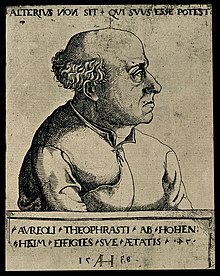Paracelsan
| Paracelsus | |
|---|---|

1538 portrait by Augustin Hirschvogel
|
|
| Born |
Theophrastus von Hohenheim 1493 or 1494 Egg, near Einsiedeln, Schwyz (present-day Switzerland) |
| Died | 24 September 1541 (aged 47) Salzburg, Archbishopric of Salzburg (present-day Austria) |
| Other names | Aureolus Philippus Theophrastus, Doctor Paracelsus |
| Alma mater | University of Ferrara |
| Era | Renaissance philosophy |
| Region | Western Philosophy |
| School | Renaissance humanism |
|
Notable ideas
|
Toxicology "The dose makes the poison" |
|
Influences
|
|
Paracelsus (/ˌpærəˈsɛlsəs/; 1493/4 – 24 September 1541), born Theophrastus von Hohenheim (full name Philippus Aureolus Theophrastus Bombastus von Hohenheim), was a Swiss physician, alchemist and astrologer of the German Renaissance.
He was a pioneer in several aspects of the "medical revolution" of the Renaissance, emphasizing the value of observation in combination with received wisdom. He is credited as the "father of toxicology".
He also had a substantial impact as a prophet or diviner, his "Prognostications" being studied by Rosicrucians in the late 16th and 17th centuries. Paracelsianism is the early modern medical movement inspired by the study of his works.
Paracelsus was born in Egg, a village close to the Etzel Pass, some 3 km north of Einsiedeln, Schwyz. His father Wilhelm (d. 1534) was a chemist and physician, an (illegitimate) descendant of the Swabian noble family Bombast von Hohenheim. It has been suggested that Paracelsus' descent from the Bombast of Hohenheim family was his own invention, and that his father was in fact called Höhener and was a native of Gais in Appenzell, but it is plausible that Wilhelm was the illegitimate son of Georg Bombast von Hohenheim (1453–1499), commander of the Order of Saint John in Rohrdorf.
...
Wikipedia
